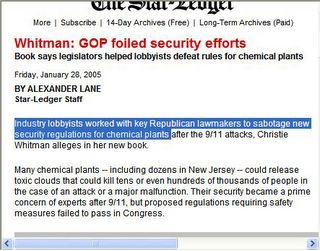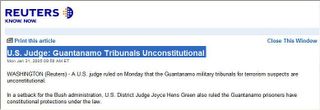
Industry lobbyists worked with key Republican lawmakers to sabotage new security regulations for chemical plants
Whitman: GOP foiled security efforts
Book says legislators helped lobbyists defeat rules for chemical plants
Friday, January 28, 2005
BY ALEXANDER LANE
Star-Ledger Staff
Industry lobbyists worked with key Republican lawmakers to sabotage new security regulations for chemical plants after the 9/11 attacks, Christie Whitman alleges in her new book.
Many chemical plants -- including dozens in New Jersey -- could release toxic clouds that could kill tens or even hundreds of thousands of people in the case of an attack or a major malfunction. Their security became a prime concern of experts after 9/11, but proposed regulations requiring safety measures failed to pass in Congress.
In her new book, "It's My Party Too," former New Jersey Gov. Whitman -- who was head of the Environmental Protection Agency as the debate raged in Congress and the Bush administration -- placed the blame squarely at the feet of chemical-industry lobbyists and congressional Republicans.
Whitman wrote that she and Homeland Security Secretary Tom Ridge crafted rules requiring the 15,000 most high-risk plants to "take reasonable steps to address those vulnerabilities, and report to the EPA that they had complied."
"Although both Tom and I agreed such legislation was necessary, strong congressional opposition -- led by some Republicans on the Senate Environment and Public Works Committee and the House Energy and Commerce Committee -- to giving EPA even this modest additional statutory authority made it difficult to secure administration support," Whitman wrote, singling out Sen. James Inhofe (R-Okla.) and Rep. Billy Tauzin (R-La.) for blame.
She said she grew so frustrated she formally asked the White House to "relieve EPA of its lead responsibility for reducing the vulnerability of the chemical sector to attack."
"The American Chemistry Council (a chemical-industry lobbying group) fought hard against my efforts," Whitman wrote. "I sometimes wonder whether those companies spend more money trying to defeat new regulations than they would by simply complying with them."
There are still no federal regulations requiring chemical facilities to gird against attack.
American Chemistry Council spokeswoman Kate McGloon said the group was taken aback by Whitman's charge.
"We're kind of surprised by the tone of her comments, given that we worked a lot with her," McGloon said.
McGloon said the council supported federal security regulations, just not ones that would take too much decision-making power away from company experts.
"Process safety is what we do," McGloon said. "There is a grave concern about putting the responsibility for those kinds of decisions in not-expert hands."
Sen. Jon Corzine (D-N.J.), who has introduced his own strict chemical-plant bill, seized on Whitman's comments as confirmation of his long-held contention that industry lobbyists had defeated any new security rules.
Corzine said he planned to re- introduce his bill next week, along with a companion measure that would provide new rules for the rail transportation of hazardous chemicals.
Early this month, a derailed train car in South Carolina released noxious chlorine gas, killing nine people in a nearby town with toxic fumes, injuring 250 and prompting the evacuation of more than 5,000 people.
Potential scenarios in New Jersey -- a major center of chemical manufacturing -- are far more alarming. For example, the Kuehne Chemical Co. in Kearny told the government in 1999 that one of its railroad tank cars could produce a chlorine cloud that "would be immediately dangerous to both life and health for a distance exceeding 14 miles."
The FBI has called the nexus of the Turnpike, Amtrak's Northeast Corridor and Newark Liberty International Airport the most vulnerable two miles in the country to a chemical-plant attack.
"The chlorine train wreck in South Carolina is likely to get some people to wonder whether they should reconsider their positions on this," Corzine said.
Alexander Lane covers the environment. He can be reached at ala ne@starledger.com or (973) 392-1790.
Copyright 2005 NJ.com. All Rights Reserved.

